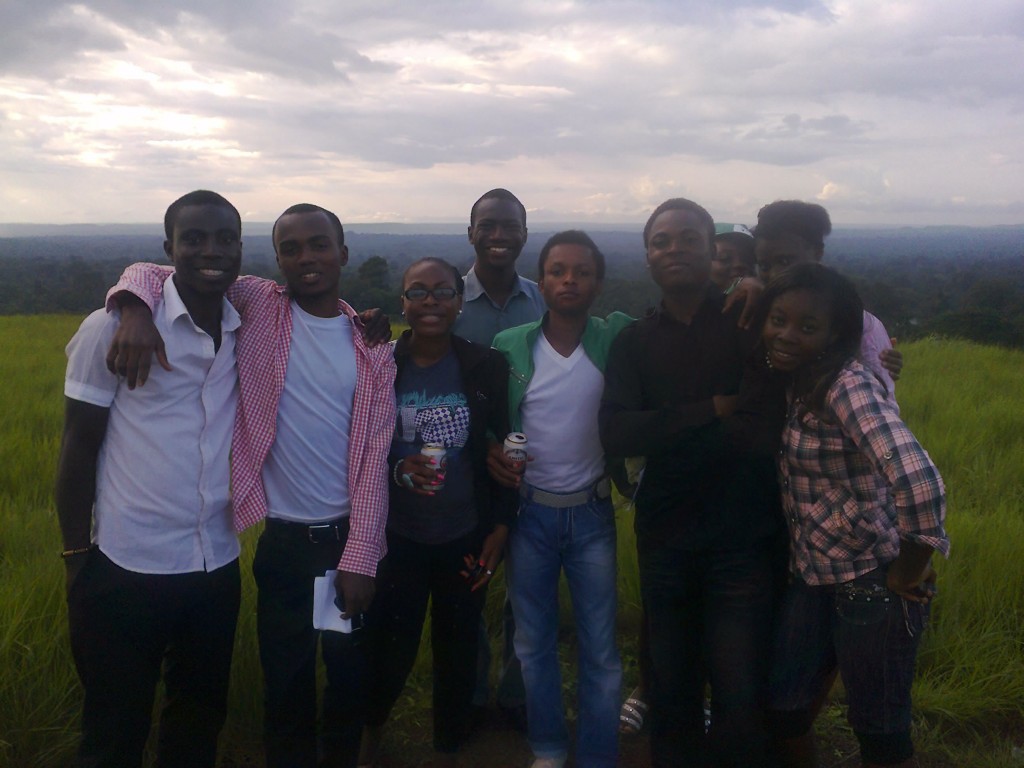I have just completed my undergraduate studies at the University of Nigeria. I’m home. I’m waiting for the compulsory National Youth Service Corp call-up. I need to get into something—something that pays—as a way of evading the expectant eyes of my parents and younger ones. While I frown at the certainty of slipping into independence, nostalgia keeps interrupting my thoughts, drawing a continuous pattern of near involuntary smiles on my face. And, like all nostalgia, the source of this is well known. The source of this is The Writers’ Community (TWC), my family during my undergraduate days.
But let us count from Number One.
I was born in Aba. I grew up there, in a city that presents its residents everyday with harsh realities: bad road network, poor sanitation, electricity supply that does not hold out longer than the flare of a matchstick, a neglected economy. These have always been the Aba insignia. As is natural, human beings must adapt to their environment. It is adaptation that gives us our survival kit to face everyday and overcome it. It is the mode of adaptation of the Aba people that has led to the city being referred to as a thugs’ camp of some sorts. “Aba is for gra-gra”. That double-barreled expression ‘gra-gra’ brings to mind a few negative qualities. Talk about overt hostility, violence and intimidation—qualities that pertain only to the physical, qualities that are there to foster what I have come to call ‘economic cannibalism’ or ‘eat from whoever you can suppress’. Hence, the belief is that no living soul in Aba pays attention to the head, to intellect, to books. This is a lie, at least in my own case.

I recognized this lie at a tender age while I walked the lengths and breadths of this city almost everyday. “Ncha! Ncha!” and sometimes “Akilu! Akilu!” Yes. That would be me with a tray of soap and detergents or bitter kola set up on my head, blaring like a full-powered public address system. Hawking and advertising for my late beloved grandma did not only open my eyes to the harsh realities I have mentioned, it also made me recognize that in some unsuspecting corners of the city, there were shops where old books were being sold, shops hidden as though they contained taboo.
I began to take advantage of these shops. One was at the Shopping Centre Complex along Asa Road. The owner was a man who perched his binoculars on his nose, spent most of his time mending these books and often gave a stern shake of his head when I, as little as I was, tried to take advantage of the fact that his books were not new. He would stand by the shake of his head, forcing me to run home, scrape some notes from here and there and run back to get the books. I bought these mended books in dozens. It did not matter if their authors’ names were not there. It did not matter, even, if the book covers were replaced with cardboard sheets now bearing the title page cut out from the books. What mattered was that as I discovered other shops, including the big one with costly books at the Aba Post Office, I began to enjoy the sights and the sounds of distant lands. What mattered was that I formulated my own fortune of encountering beautiful works like F. H. Burnett’s A Little Princess, Monica Dickens’ The House at World’s End, Enid Blyton’s The Children of Willow Farm, C. S. Lewis’ Prince Caspian, Denise Hill’s Counterplot in Riot City, Anna Sewell’s Black Beauty, Charles Kingsley’s The Water Babies, Piers Anthony’s Centaur Aisle; Shadows of Sanctuary (part of the Thieves’ World series), J. R. R. Tolkien’s The Hobbit, Ed Greenwood’s Spellfire, H. Rider Haggard’s King Solomon’s Mines (this one came with no cover page and no title page!), Montezuma’s Daughter, and She; Harry Harrison’s War with the Robots, Lynne Reid Banks’ The Mystery of the Cupboard, and so on and so forth.
All this was a mixture of children fiction and adult fiction; fantasy and realist fiction; adventure and science fiction. Slim and fat books. My mind coiled cozily around the stories told in them and the characters that live in them. They captured me so much that at about the age of thirteen I began to try my hand in writing. Now that I write this, I can only say that I thought I had it all. But, unknown to me, I was still far away from home because all the books I encountered were still foreign. All the settings and the characters that I invented in my works were foreign also. Obviously, I did not know what was happening in the African, indeed Nigerian literary scene. I thought that the only writers we had were Chinua Achebe, Buchi Emecheta, Theresa Meniru and Adaeze Atuegwu. We read their works at school only during Literature-in-English classes.
It would be my post-secondary school experience that opens up Number Two.

I got into the university in the year 2010. I was the typical freshman—eyes focused on course books and, at the same time, a distant possible graduation. I declined joining any religious group. “I can’t stand religion.” I declined joining my akporakpo, a group of students from the same town. “I am not interested.”
“What about the church choir? You could train your voice. I see you love music,” my roommate said to me one day.
“Nah. It will eat up my time. And, besides, it has a lot to do with religion too.”
But walking into the Faculty of Arts as a freshman changed my life. I found out that there was a group for student writers. This group has two boards where it publishes members’ works! Every day, I stood in front of these boards, taking in the beauty of words laced with each other, lines plaited into lines, lithe sentences that jumped at my wide eyes. These were works by young people like me. These were works that were authentically African yet sincere in their expressions. I made up my mind to join that group—The Writers’ Community (TWC). I was not straying. I was walking in the direction of my passion.
The first meeting of the house that I attended further pried my eyes open. I realized that there were people who loved literature as though it were food. I saw young minds swimming with each other in the discussion of books. I watched Gerald Olisaemeka, the then Custodian of the community, with his posh, yet original accent, talk about literature and its surrounding issues with the passion of a man promised a million dollars. I think it was at the end of this first meeting that he said to me, “I like ‘Rhapsody’. I’m putting it up on the board.” ‘Rhapsody’ was a poem that I had written at the intending members’ test. That singular pat on the back set my ego on fire, made me want to write more, to read more, to hone my craft and be able to discuss and argue literature like the old members. I discovered home there. I discovered that African literature truly existed.
I became the third Custodian of The Writers’ Community (TWC), University of Nigeria, Nsukka in the year 2013. Being in that position did not only give me the honor of witnessing the blooming of such awing talents as Michael Umoh, Oluchukwu Pius Ifechukwu, Arinze Ifeakandu, Obi-Young Otosirieze, CharlesBruno Eze, Ebenezer ‘Eezer’ Agu and others, it also afforded me the vantage point of seeing how a community can support itself in the name of the art.
With time, the weekly house meetings became more fun. In every meeting, we would sit together, reading our works for the week on the basis of first come, first reviewed. At the end of each reading, members of the house would say what they think of the work read. The insights presented by each and every one of us are drawn from what we have read so far and what personal experiences we have when it comes to writing. Some of us, like Arinze, have had the opportunity of being in writers’ workshops such as that organized annually by Farafina. Others, like CharlesBruno, are fanatics of criticism. Standing on such collective advantage, TWC members benefit from a whole universe of options for the bettering of their individual creative works.

This creativity support extends itself in the private. I can remember coming home for a long holiday (it was actually a holiday that turned into a lecturers’ strike), having a whole lot of time to write in the absence of academic burdens yet having no reliable second eye to look at these works I was doing. It was the members of the community that I began communicating with. We started sharing works-in-progress via email, expressing our thoughts on the same works using the social network. By this means I was able to have two perfect short stories at the ready before the holiday elapsed.
As is expected, new members of the community may feel intimidated at the face of the intimacy and ‘authority’ that old members exhibit in the discussion of books or other literary elements. But with time, these members receive the special attention of the house, including a thorough review of their works. Amidst the arguments and counterarguments, which are always like music to my ears, these new members find their footing. They get to realize that those ‘negative’ things being said about their works are not actually negative, that they are statements that contain what the true responsibilities of a writer are to his reader. In addition, they find their place quicker when they go out there and get the books that are often mentioned during discussions (the community’s unique way of prescribing books). Their confidence becomes theirs. Their art becomes universal.
Finally, the works that get reviewed go to the publication boards. Unfortunately, for now this is as far as these works can go. As a student, walking out with members at the end of every meeting, trading jokes, laughing, smiling or expressing pleasure at a new work written by one of us, I was always looking forward to another Saturday. I’m sure that others share this same enthusiasm.
Now, one can only imagine the height of self-confidence and encouragement that each member of the community would have at the sight of their creative works appearing in a book. As student writers who are struggling with meager resources, TWC members may not be as lucky as the Elizabethan writers who, it is said, had patrons. We live within our confines, hoping that soon the community will generate financial support with which to get the works of the members published.
For now, in our creativity, we have grown to become each other’s keeper. And we stay tied together.
Art in Context is a continuing column on the usage and impact of art, artists, and the business of art in building, and sometimes exploiting, communities around the world. Edited and curated by Chiwan Choi.
